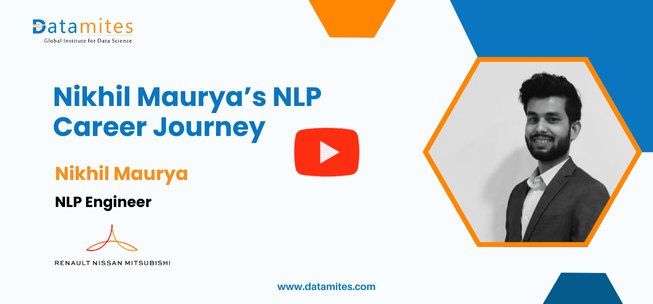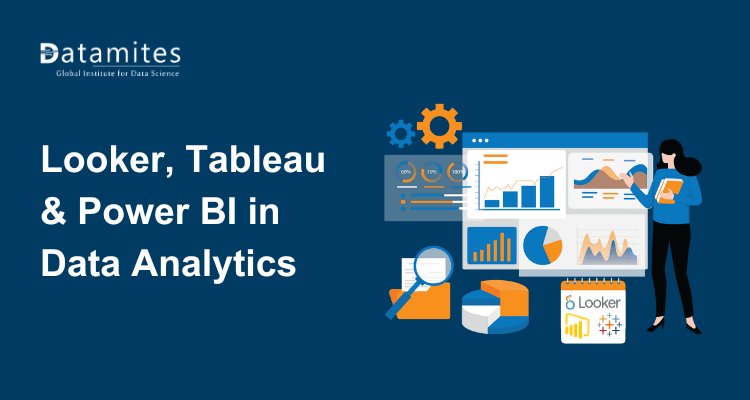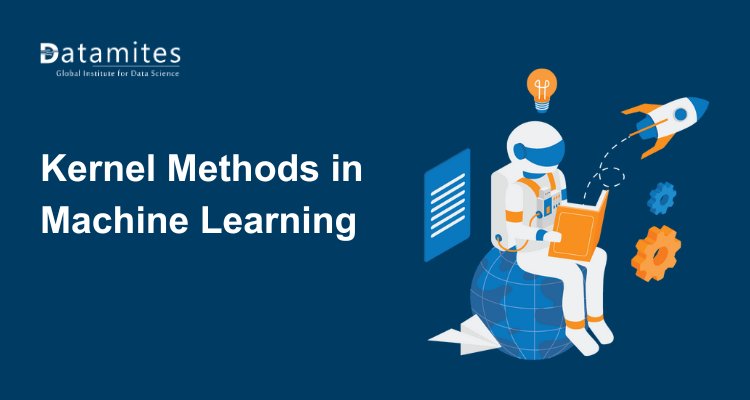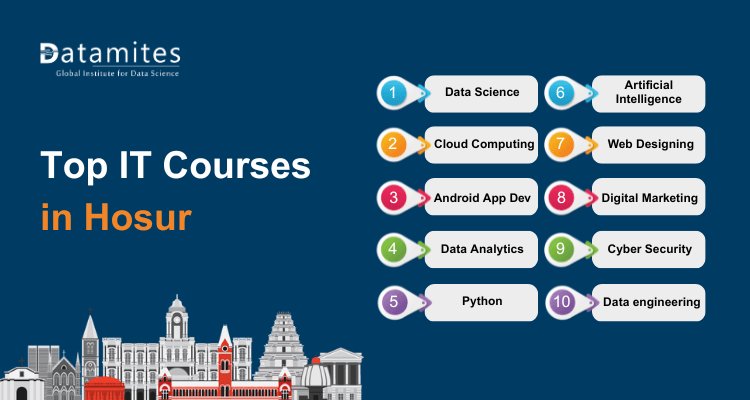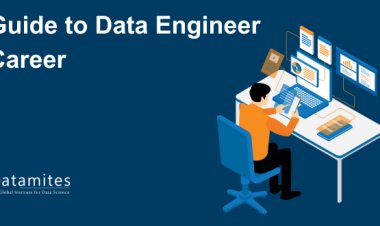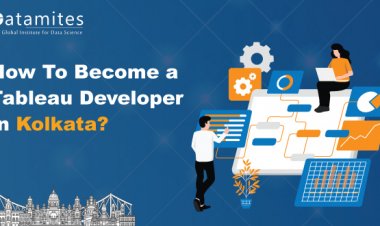Turning Passion into Profession: Nikhil Maurya’s NLP Career Path
Discover how Nikhil Maurya transformed his passion for language into a thriving career in Natural Language Processing (NLP). From curiosity to cutting-edge projects, his journey is both inspiring and insightful. Learn how he bridged the gap between tech and linguistics.
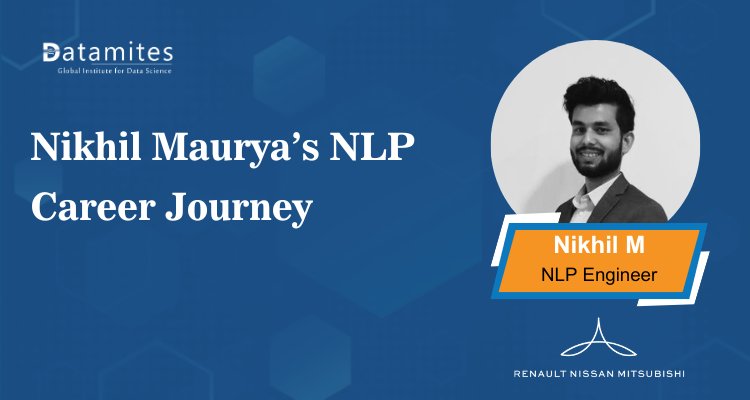
In a world where language meets technology, Natural Language Processing (NLP) is quickly emerging as one of the most exciting and impactful fields in data science. But how does one break into this complex domain especially without a traditional tech background? In this inspiring alumni talk, we sit down with Nikhil Maurya, a DataMites alumnus who transitioned from mathematics and education into a thriving career in NLP. From navigating a beginner-friendly learning path to landing real-world projects, Nikhil shares his honest journey, practical tips, and the role DataMites played in shaping his success. Whether you're a curious beginner or someone eyeing a career shift, his story might be the nudge you need.
From Mathematics Graduate to NLP Engineer– Interview with Nikhil Maurya
Meet Nikhil Mourya, a former DataMites student who transitioned from a mathematics and education background to working as an NLP Engineer at Renault Nissan Tech Park.
Q1: Can you tell us a bit about yourself and your background?
Sure! I graduated with a degree in Mathematics and then pursued a Bachelor of Education (B.Ed.), aiming to become a teacher. However, the COVID-19 pandemic pushed me to explore other opportunities, and that's when I discovered Data Science and joined DataMites.
Q2: What made you choose DataMites for your data science training?
I chose DataMites because of their structured and comprehensive data science course. Despite coming from a non-technical background, I found their curriculum very beginner-friendly. They offered everything from Python, statistics, machine learning, and even an internship opportunity which helped me gain practical exposure.
Q3: What role did DataMites play in helping you get placed?
A huge role! Before joining DataMites, I never imagined getting into a tech company. Their placement support, mock interviews, and real-world projects during the internship made all the difference. They helped me land my first role and build confidence in my skillset.
Q4: How did you approach learning the mathematics behind machine learning?
I took a self-driven approach. For every algorithm I learned, I made a point to Google or YouTube the underlying mathematics. Even understanding the basics gave me a strong idea of how the algorithm functions. I highly recommend everyone to do the same—just grasping the fundamentals can make a big difference.
Q5: What was your experience learning deep learning during your training?
When I began, deep learning was still emerging. Tools like ChatGPT-2 had just launched and weren't mainstream yet. Now, with the advancements in large language models (LLMs), courses have become more comprehensive. The updated syllabus now includes topics like OpenAI models and variational autoencoders, making it a great time to dive into deep learning.
Q6: How is the current data science syllabus structured?
The curriculum is thoughtfully designed to cover key areas within a 3- to 4-month timeframe. It focuses on the essentials like Python, statistics, machine learning, and deep learning. Importantly, it doesn’t overwhelm learners with unnecessary topics like full object-oriented programming just what's needed for data science.
Q7: Did you follow a specific study pattern during your learning or interview preparation phase?
Yes, I followed a structured approach. First, I emphasized understanding the data before jumping into algorithms. Many learners make the mistake of directly applying algorithms without analyzing the dataset. My strategy involved:
- Sampling the dataset using statistical techniques.
- Analyzing relationships between independent and dependent variables.
- Documenting observations before writing any code.
- Comparing different algorithms to find the best fit.
- This practice helped me immensely during my internships and real-time projects.
Q8: What kind of theoretical questions should one expect in a data science interview?
In most data science interviews, you will encounter foundational theoretical questions. One recurring topic is the Central Limit Theorem (CLT), along with normal distribution and the bell curve. These are essential statistical concepts that every data science candidate must understand thoroughly, as they are asked in nearly every interview.
Q9: What type of questions are asked in the machine learning section?
Interviewers often focus on:
- How basic algorithms like logistic regression and linear regression work.
- When to use each of them depending on the type of data.
- Techniques for optimizing models when results are subpar.
A frequent interview scenario involves discussing how to handle biased datasets. For example, if 90% of your classification data belongs to the "yes" class and only 10% to "no," how would you address this imbalance?
Another common focus is outliers, and it’s important to understand their impact and how to handle them effectively.
Q10: Is it essential for beginners to learn cloud services?
Absolutely! While you can store your work on a local system, learning to deploy projects on the cloud has significant advantages. Once you complete the syllabus covering Python, SQL, Statistics, and AI/ML, I highly recommend learning some cloud platforms. Try deploying small projects; it helps you gain hands-on experience and a better understanding of cloud services.
Q11: What platforms did you use during your job search?
After completing my course and internship, I submitted my resume to DataMites, and also applied on job portals like Naukri and LinkedIn. Although I used multiple platforms, most of the job calls I received came through DataMites. They have a great placement team that helps freshers get noticed in a market that mostly favors experienced candidates.
Q12: How difficult is it for freshers to get a job in data science?
It is definitely a challenge. The job market for data science is booming, but most roles require 2–3 years of experience. As a fresher, I didn’t receive many calls initially. That’s why I advise freshers to grab any opportunity be it an internship or an entry-level role. Don’t worry too much about the initial pay. Once you have 1–2 years of experience, you can expect a 300–400% hike in your salary and better opportunities.
Q13: How did your internship at DataMites help you?
The internship was a game-changer. Classroom learning is more academic, but internships give you real-world exposure. I worked on 4–5 projects where I applied everything I learned from data processing to building ML models. These projects helped me build a strong portfolio and prepared me for real-time industry work. The internship is essentially a replica of what you’ll face in your actual job.
Q14: What final advice would you give to data science freshers?
Keep learning and don’t wait for the perfect opportunity. Take any chance that comes your way, build experience, and enhance your skills. Focus on completing internships, maintaining a strong GitHub profile, and learning cloud deployment. These will help you stand out and succeed in your data science career.
Refer these below articles:
- From Engineer to ML Engineer: Rahul Thota’s Inspiring Journey
- How Bhavya Made a Successful Leap into Artificial Intelligence
Key Findings from the Interview with Nikhil Mourya:
Nikhil Mourya emphasized the growing role of data science in decision-making and highlighted the importance of adapting to rapidly evolving technologies.
- Career Shift During COVID-19: Nikhil transitioned from a teaching background to data science during the pandemic, showcasing the field’s accessibility to non-tech individuals.
- Beginner-Friendly Training at DataMites: He chose DataMites for its structured curriculum, which was easy to follow even without prior technical experience.
- Strong Placement Support: DataMites played a vital role in his placement through mock interviews, resume sharing, and real-world projects.
- Efficient Syllabus Design: The course avoids unnecessary topics and focuses on practical skills in Python, statistics, ML, and deep learning within 3–4 months.
- Internships Bridge the Academic-Industry Gap: Internships provide real-time experience, enabling learners to apply theoretical knowledge to practical business problems.
- Hands-on Projects Are Essential: Working on 4–5 solid internship projects helps solidify understanding and prepares learners for real-world scenarios.
- Early Career Focus Should Be on Learning, Not Salary: Freshers are advised to accept initial opportunities—whether internships or full-time roles—to build experience and skills.
- Experience Leads to Better Opportunities: With 1–2 years of experience, professionals can command much higher salaries and access a broader job market.
Read these below articles:
- Is There Still a High Demand for Artificial Intelligence in Ahmedabad?
- How High is the Demand for Artificial Intelligence in Delhi?
- The Growing Demand for Artificial Intelligence in Kolkata
Nikhil’s journey highlights the importance of practical skills, hands-on experience, and persistence for landing a data science job as a fresher. His advice to leverage cloud services, maintain a GitHub profile, and gain real-world experience through internships provides a clear roadmap for aspiring data professionals.
Whether you're just starting out or looking to enhance your employability, these insights can be the key to unlocking a successful career in data science. According to Fortune Business Insights, the global Natural Language Processing (NLP) market size was valued at USD 24.10 billion in 2023 and is projected to grow from USD 29.71 billion in 2024 to USD 158.04 billion by 2032, exhibiting a CAGR of 23.2% during the forecast period.
DataMites is a globally recognized training institute specializing in data science, artificial intelligence, machine learning, deep learning, and other emerging technologies. Datamites is known for its comprehensive, industry-relevant courses designed to help individuals from both technical and non-technical backgrounds build successful careers in the data domain.
DataMites offers artificial intelligence courses in Bangalore, accredited by both IABAC and NASSCOM FutureSkills, ensuring globally recognized credentials for its learners. With a beginner-friendly curriculum, the institute enables individuals from non-technical backgrounds to easily understand complex data science concepts through hands-on learning and real-world case studies.
To cater to diverse learning needs, DataMites offers flexible learning options across various cities, including artificial intelligence training in Hyderabad, Bangalore, Chennai, Mumbai, Pune, Coimbatore, and Ahmedabad. These options include self-paced modules, live virtual classes, and in-person classroom training. With a strong and growing alumni network, DataMites has successfully helped thousands of professionals launch and advance their careers in the dynamic field of data science and artificial intelligence.
